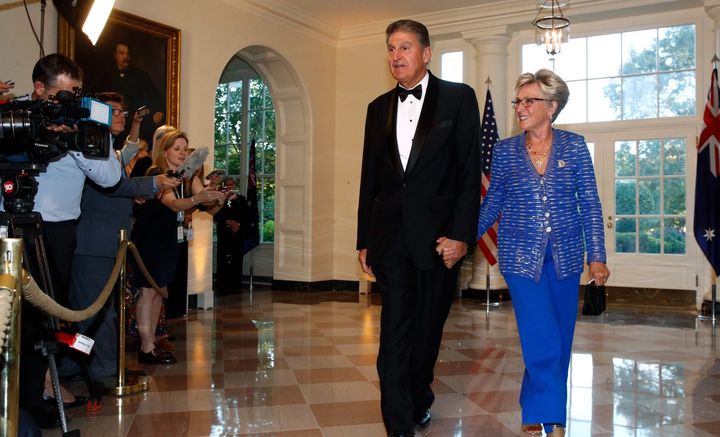This story was co-authored by investigative reporter Daniel Boguslaw.
Sen. Joe Manchin (D-W.Va.) isn’t the only Manchin in government mixing politics and business.
The corporate Democrat spent the past year grabbing headlines for obstructing his party’s agenda, in particular gutting and ultimately blocking climate legislation that would impact the fossil fuel industry in which he and his family made their fortune. Last week, for example, he vowed to block progressive nominee Sarah Bloom Raskin from the Federal Reserve due to her willingness to factor climate science into the Fed’s monetary policy.
Far less attention has been afforded to the senator’s wife, Gayle Manchin, a former West Virginia secretary of education, who in March 2021 was appointed by President Joe Biden to co-chair a commission that distributes federal infrastructure grants across 13 states, including West Virginia.
But now an investigation suggests Manchin might have financial ties to a recipient of funding from that commission, an economic development partnership agency called the Appalachian Regional Commission (ARC).
Late last summer, ARC awarded a $1.5 million grant to the Appalachian Investors Alliance (AIA), a non-profit foundation that works to deliver investment to small Appalachian businesses. The nonprofit’s director, Mike Green, is a prominent West Virginia venture capital manager who also serves as the officer and organizer of West Virginia Growth Investment LLC — a company in which Gayle Manchin has invested, according to federal financial disclosures.
Virginia Canter, the chief ethics counselor of the nonprofit Citizens for Responsibility and Ethics in Washington (CREW), said that Manchin’s financial ties to Green may have posed a conflict of interest. Canter, who served as an ethics counselor to former presidents Bill Clinton and Barack Obama, recommended that the Manchin family divest their West Virginia business interests to avoid any potential issues.
“Since ARC investments support hundreds of economic development projects across the Appalachian Region, to avoid any potential conflict of interest, Ms. Manchin should commit to divest her and her spouse’s investments in businesses located in that region that could benefit from ARC projects and funding,” she said.
Overlapping Financial Ties
Despite making the news in 2016 for her role lobbying for schools to stock epinephrine autoinjectors, leading to a near-monopoly for EpiPens manufactured by her daughter’s former employer Mylan, Manchin’s tenure in the Biden administration has largely flown under the radar.
So ARC’s announcement last September that it had awarded $1.5 million to the AIA received little attention. The grant, part of ARC’s Partnerships for Opportunity and Workforce and Economic Revitalization (POWER) Initiative, was characterized as a “special regional project” that would “create new access to capital by creating and supporting angel and micro-venture funds in small and growing Appalachian businesses.” According to the Ironton Tribune, the POWER initiative “targets federal resources to help revitalize the economy in fossil-fuel impacted communities.”
ARC first awarded funds to the AIA in 2019, before Manchin’s tenure, in order to create four new angel funds in the Appalachian region to be capitalized with private funding. But ethics experts said the 2021 grant raised serious questions, given the financial ties between Manchin, ARC’s new co-chair, and Green, the alliance’s director.
Financial records show Manchin owned a stake in West Virginia Growth Investment LLC worth between $15,000 and $50,000 in 2020. Green is listed as the LLC’s organizer and officer in West Virginia business records.


